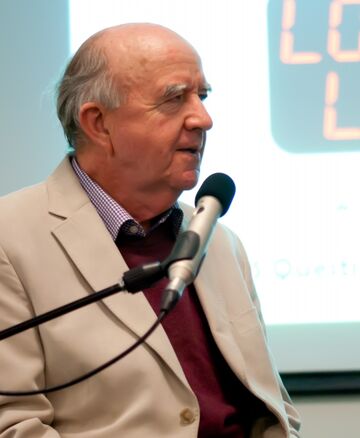
Therefore since we have confidence to enter the Most Holy Place by the blood of Jesus … and since we have a great priest over the house of God, let us draw near with a true heart and full assurance of faith.
(Hebrews 10:19-22)
I wonder when you feel close to God?
When you are on your own, not distracted by other people? … When you are relaxed enough, and in the mood for meditation? … In a church building? When you receive Holy Communion?
Perhaps you feel close to God when you are close to nature? Perhaps by the sea, or in a forest, or by a lake? … When you hear spiritual music?
Do you feel close to God often, or just occasionally?
And I wonder what you do when God seems far away, in times of trouble, or sickness, or distress. … Do you sometimes think that your prayers go no further than the ceiling?
Do you panic, or just wait until he seems closer, or give up?
When do you feel close to God?
God up Close
In Old Testament times, God came to live among his people in his glory, and his dwelling place was the temple in Jerusalem. His throne on earth was the ark of the covenant, and his throne-room was what was called the “Most Holy Place.”
At that time, you could get close to God by going on pilgrimage to Jerusalem and visiting God’s temple. But you couldn’t get really close to God. Only the high priest could do that, and only on one day in the year, on the Day of Atonement.
Fulfilled in Christ
But these things—the temple and the high priest—were God’s signs and promises of something better. The temple was a visible sign of the Christ to come; and the high priest was a visible sign of the Christ to come. And the sacrifices of the Old Testament were also visible signs of the Christ to come.
When Jesus said “destroy this temple, and in three days I will raise it up” (John 2:19), those who heard him thought he was talking about the temple in Jerusalem. But he was talking about himself as God’s temple on earth. He would be put to death, but would rise again. Jesus God’s Son was how God was present on earth.
Jesus replaced the temple. He replaced the high priests. Jesus replaced the sacrifices. As the temple he was God’s presence on earth; as priest he offered the sacrifice; and the sacrifice he offered was his own death on the cross.
This is why the writer of Hebrews tells us that we:
… have confidence to enter the Most Holy Place by the blood of Jesus … and since we have a great priest over the house of God, let us draw near with a true heart and full assurance of faith. (Heb 10:19-22)
The Most Holy Place is heaven itself, where God dwells in light, glory, power, and love. And we can enter God’s presence at any time, in any place, in any situation, because Jesus himself—God’s own Son—is our great high priest whose death was the one and only true sacrifice for sin (c.f. Heb 10:11-14).
So we can have confidence: first because Jesus has sacrificed himself for our sin on the cross; and second, because Jesus is our great high priest who always lives to make intercession for us (Heb 7:25). As the Reformer John Calvin writes, “When we pray, God hears our prayers from the lips of his Son, our great high priest and intercessor” [Adapted from Calvin’s Catechism].
Let Jesus be Jesus
I heard recently of a woman who decided to walk the Camino, the pilgrimage to Compostella in Spain. Ailsa Piper offered to carry other people’s sins for them on her pilgrimage—and some people did indeed write to tell her of their sins. I don’t know what she did with the sins when she got to Compostella! But we don’t have to carry the sins of others; we don’t even have to carry our own sins; because Jesus bore our sins in his body on the cross (1 Peter 2:24). So we can enter God’s presence through Jesus our great high priest, and his single sacrifice for sin.
What it means
Consider each of these statements carefully:
- We can enter God’s presence at any time, in any place, in any situation, no matter what our circumstances.
- We enter God’s presence by Jesus.
- The only barrier to our entering God’s presence is our sin.
- But by his death Jesus offered a single sacrifice for sin in our place.
- So we can enter God’s presence by the blood of Jesus.
- So we can enter God’s presence through Jesus our high priest.
And so we can enter God’s presence with “confidence,” and with “full assurance of faith” (Heb 10:19,22)
And notice too what it doesn’t mean:
- You don’t have to be in a special place, or in a state of peace and quiet.
- You don’t have to be on your own, nor do you have to be with other people.
- You don’t have to be in church.
- You don’t have to be good enough, or have strong faith.
- You don’t have to get God’s attention.
- You don’t have to feel like your prayers are getting through.
- You don’t have to be a specially religious person. Your Christian life may be fitful. You may not know much about Christianity. You may have wandered away from God for years.
- Your world can have collapsed around you, and you can still have confidence to enter the holy place by the blood of Jesus our great high priest
- You can have ignored God for all of your life, and you can still have confidence to enter the holy place by the blood of Jesus our great high priest
- You can be deeply ashamed of your past or present life, and you can still have confidence to enter the holy place by the blood of Jesus our great high priest
- You can have committed the worst of sins, and you can still have confidence to enter the holy place by the blood of Jesus our great high priest
- You may suffer from depression, or anxiety, or any other upset or disturbance, and you can still have confidence to enter the holy place by the blood of Jesus our great high priest
- You can be at death’s door, and still have confidence to enter the holy place by the blood of Jesus our great high priest
- Our confidence to enter the heavenly sanctuary doesn’t come from ourselves or our circumstances, but from “the blood of Jesus”, and because he is our “great priest over the house of God.”
These truths are at the heart of the gospel. And they are also at the heart of the Reformation. As Calvin writes:
The highest human good is to be united with God…It is our unworthiness that keeps us from approaching him, and so it is the work of Christ our high priest to stretch out his hand and lead us to heaven. Although the Old Testament high priest carried the names of the twelve tribes on his shoulders and their symbols on his breast, yet he went into the sanctuary alone in their place. But we rely on Christ our high priest, so we enter by faith right into heaven through and in him. God appears to us openly and invites us lovingly to meet him face to face.
(Adapted from his commentary on Hebrews 7:23-25).
What breathtaking news! Being close to God is not a matter of where you are, who you are with, how you feel, how good you have been, how religious you are, or how spiritual you feel.
We all come to God the same way, by the same person, Jesus, and by his one work, his sacrifice for sins in his death on the cross.
May God in his mercy; give us such faith in Christ our great high priest; and his single sacrifice for sin; that we may now have confidence to enter God’s heavenly sanctuary; with a true heart, in full assurance of faith.
Adapted from a sermon preached in St Paul’s Cathedral Melbourne, 15th October 2017. This version first published at The Gospel Coalition website, reproduced by permission.
Photo by Ketut Subiyanto: https://www.pexels.com/photo/woman-wearing-a-face-mask-on-the-subway-4429461/



